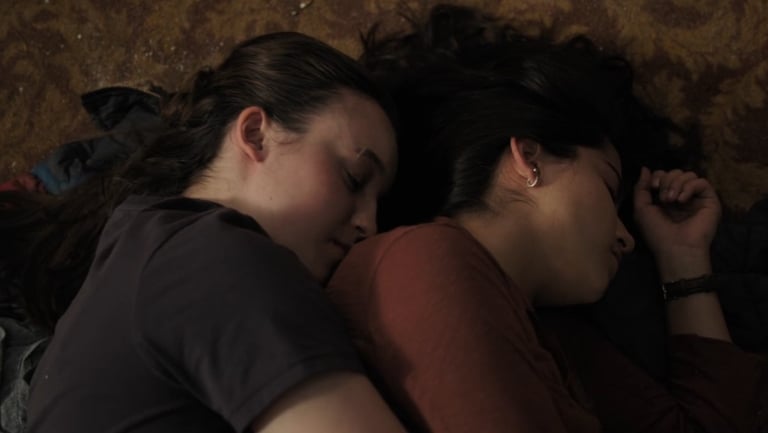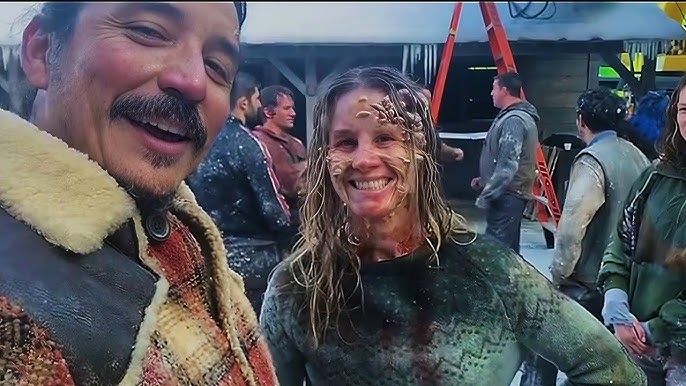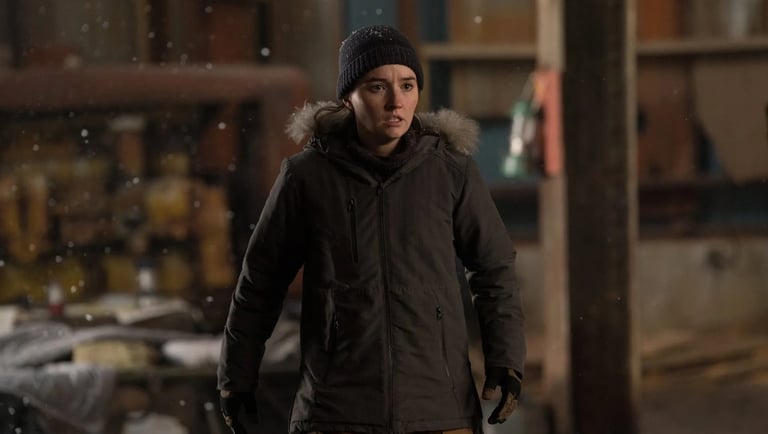The Last of Us Season 2 Recap: Why It Hits Different for Queer Fans
A spoiler-forward recap of The Last of Us S2 exploring Ellie & Dina’s friends-to-lovers arc, the immunity reveal, Dina’s backstory, and why the season hits queer fans so hard.
DISCUSSIONTVTHE LAST OF US
Big Gay Energy
9/20/202510 min read
We recorded an episode about The Last of Us Season 2 for and this post is our written takeaways from that conversation. We wanted to pull together everything we felt mattered most for queer viewers, why Ellie and Dina’s storyline lands so hard, and why the season’s choices created such a strong emotional ripple. This is a long read, because this season deserves it, and because there is so much to unpack when a show gives us queer intimacy, grief, and complicated moral choices all at once.
Dina and Ellie, and why friends to lovers works so well here
Ellie operating in the friends to lovers template makes sense on a character level, and this season leans in with confidence. In a world where trust is rare currency, romance that grows out of friendship feels true to life. Ellie’s pattern is trauma bonding, which is living under constant threat. To love someone in this world you need to trust them, and that trust often arrives first as friendship.
Isabela and Bella, the actors playing Dina and Ellie, have ridiculous chemistry. We mean it in the best way. It is not just about how good they look together. The timing, the little facial beats, the sarcasm, the comfortable silences, all of that makes their relationship feel natural. When we talk about queer representation that feels authentic, that is exactly what we mean.
We also appreciated the choices the show made about how to reveal that connection. The barn with the twinkle lights was a direct nod to the game, and it landed as an emotional touchstone for people who loved the source material.
Awkward, tender, and so queer
Ellie’s reaction to Dina’s advances reads exactly how you would expect: surprise, confusion, a brain full of questions, and then the dawning realization that maybe everything is not as casual as it seemed. The show plays that with humor too. Ellie later rates a kiss a six, which is a perfect tiny, honest moment about how humans navigate new feelings. It’s goofy, it’s real, and it makes us root for them harder.
Episode four, immunity, and that five-second emotional tornado
Episode four is the season’s emotional pivot. Ellie takes a bite intended for Dina and proves she is immune. That reveal is huge, but the way the show stages the immediate fallout is what makes it devastating and beautiful. Dina, suddenly confronted with the possibility of losing her best friend, processes a lifetime of fear in a few minutes. For readers: imagine you live every hour with the possibility of losing people. When it actually becomes an immediate, physical risk, the priorities and feelings that have been simmering rise up, raw and urgent.
We loved the tiny realism beat of the stuck turnstile while the bite happens. It is such a small, relatable annoyance that literally saves them, and that is the kind of detail that makes the world feel tactile. It is also funny in a grim way. But the seriousness returns immediately when Ellie has to prove immunity. She has to show Dina that she is safe, because Dina is put in a position where she might have to make a choice no one should have to make: kill the person she loves to protect everyone else.
The five seconds that change everything
The chain reaction in that scene is wild. Immunity, the reveal that Dina is pregnant, and then the impulsive kiss are compressed into a single heart-stopping moment. From Ellie’s point of view she nearly died. Then she hears her best friend is pregnant. And then that best friend is kissing her. That emotional overload is messy and honest. It is queer and queer-adjacent in the exact way we needed: immediate, complicated, and human.
Dina’s backstory and internalized biphobia
Dina’s confession about her early awareness of attraction is quietly devastating. She said she told her mother when she was a kid that she liked boys and girls, and her mother told her no, you like boys. That single erasure ripples for years. We see the consequences of that kind of family-level repression in Dina’s repeated attempts to fit into expectations, like the on-again off-again relationship with Jesse which eventually results in a pregnancy.
That moment is so important because it illustrates a reality lots of queer people live. Internalized biphobia and self-doubt send people into relationships that make sense on paper but do not match their hearts. The show handles it with tenderness. Dina is not a villain. She is a person who has been taught a lie about herself, and watching her unlearn that while loving someone else is emotional and, frankly, excellent storytelling for representation.
The strange but emotionally mature love triangle: Ellie, Dina, and Jesse
We were pleasantly surprised by how maturely the show resolves the triangle. Jesse is not painted as a villain. He is a decent person and he genuinely loves the people involved. The trio finds a functional, if unconventional, agreement: shared responsibilities, communal care for the child, and emotional honesty. That maturity is refreshing. These are young people in an apocalypse managing adult choices the best way they can.
Ellie declares that she is going to be a dad. That line is perfect, and also a lovely queer moment. It plays with gendered parental roles and feels true to Ellie's personality. It also underscores an important theme in the series, which is the notion that parenthood can transform people. For Ellie, the realization that she might play a fatherly role is another small step toward becoming someone who can make tough decisions for the people she loves.
Joel, fatherhood, and emotional growth
Seeing Joel process Ellie's identity is one of the season’s quieter joys. He comes from a conservative, protective space. He messes up, he says the wrong things, but then he visibly learns. The scene where he steps into defend Ellie and punches the homophobe is peak dad energy. It was cathartic, and also an important narrative completion for Joel. He moves from ignorance to protection, and then to a deeper, more complicated honesty when he and Ellie finally confront the lie he told her.
The rift created by Joel’s lie about the Fireflies is a key emotional current. We love how the show doesn’t shy away from the messiness of forgiveness. Ellie is hurt, understandably. Joel is remorseful in his own way. When they finally have the heart-to-heart, they both lean into a fragile kind of reconciliation. It is rare to see a show commit to a messy parent-child dynamic and then let it remain complicated rather than wrapping it up in tidy forgiveness. That’s what makes it feel honest.
Abby, shifting perspectives, and why POV changes matter
Season two chose to stay primarily in Ellie’s present timeline, even though the game alternates more between Abby and Ellie. We think this was a strong TV choice. It allows the audience to feel anchored in Ellie’s experience and then to be destabilized when Abby’s story begins to intrude. The narrative shift creates a potent cliffhanger and sets the stage for the next season to expand the world through Abby’s eyes.
We are legitimately excited to see Abby's perspective. The game’s structure made Abby’s arc jarring for some players. On TV, the choice to make seasons feel like distinct character-focused acts makes sense. It asks the audience to keep engaging and to accept that this is not a simple revenge tale. Abby’s motives, history, and grief deserve a full treatment, and we look forward to seeing the world through her lens.
Human politics versus the cordyceps threat
One thing that stood out to us was how the cordyceps, the biological threat, receded into the background in favor of human politics. Season two is far more interested in interpersonal violence, vengeance, ideology, and cultism. That is thematically consistent with the series’ larger point: humans often become the worst threat to other humans. Still, as people who think about infectious dynamics, we could not help observing how little strategic conversation there is about the fungus itself.
That is intentional, of course. The series places the moral mirror in front of us, asking which kind of society we will be. Will we cling to community and repair, or will we let cycles of violence define us? Season two makes that gray area feel urgent, and the juxtaposition of fungal menace with human cruelty folds into an argument about how we choose to survive.
The Seraphites and the inevitability of cults in collapse fiction
The introduction of the Seraphites is chilling. They are regimented, brutal, and horrifyingly effective at creating a culture of fear and ritual. Why do cults form in any world, fictional or real? Because human beings want meaning. When structures collapse, people still want stories that explain pain and protect their identities. The Seraphites are a terrifying example of devotion weaponized.
Those early scenes with children marked as true believers are especially uncomfortable. We do not want to normalize the grooming of kids. The show confronts that ugliness directly. Those moments are meant to unsettle.
Fedra, 'voters', and the institutional amnesia of post-collapse societies
The Flashback scenes with Fedra are small and potent. The soldiers call civilians 'voters', a term that for us lands as chilling shorthand for what is lost. In a pre-collapse world, voting signified agency. In this post-collapse setting, it's a derisive label meant to separate those in uniform from those who are ordinary survivors. The officers who use that word do so casually. That casualness is the point. Younger soldiers who never lived in the old world do not know the historical weight of terminology.
This is a sharp moment about how memory gets rewritten when living generations die off. The show reminded us of the Library of Alexandria analogy. If specialized knowledge, like therapy or certain medical skills, is not passed on, we lose it. The scene with the therapist being the last of her profession underscores that loss. She is the person everyone offloads trauma onto, and she has no one to unburden herself to. That is a haunting detail about cultural amnesia.
Production choices we loved, and the power of practical effects
We binge-watched the behind-the-scenes featurettes and we have to talk about how much of this show uses practical set builds. The underground cordyceps caverns, the bodies hanging in the TV studio, the blizzard on Joel’s death night. Many of those beats are built, not CGI. Knowing that actors were literally standing on those sets made certain scenes uncomfortably immediate for us as viewers.
The commitment of the production to practical detail pays off in sensory realism. Bodies that look like bodies. Walls covered in fungus that you can almost smell through the screen. It makes the world feel tactile and dangerous, which helps the emotional stakes land harder.
Why did season two draw such vitriol online?
The online backlash was intense, and we did not love watching segments of fandom turn mean. There are a few things to consider about the anger. One, Joel’s death is a gutting moment. People who loved his character were devastated. Two, the medium shift from an interactive game to a passive TV experience changes how audiences connect. In a game you are making choices. On TV you are watching those choices happen. That difference recalibrates emotional ownership for a lot of players.
But underneath a lot of the rage were uglier things. Misogyny and transphobia bubbled up in ways we found predictable and frustrating. There were complaints about casting choices that coalesced into a messy mix: some fans demanded a one-to-one replication of game visuals, while others weaponized appearance-based criticisms against actors who are women or non-binary. That is not about fidelity. It is about reactionary gatekeeping.
We want to say this bluntly. A TV adaptation will never be the same experience as a game. That is fine. They are different mediums. They do different things. Adapting the story to fit serial television requires narrative choices. Those choices will please some people and frustrate others. That is not evil. That is art being translated.
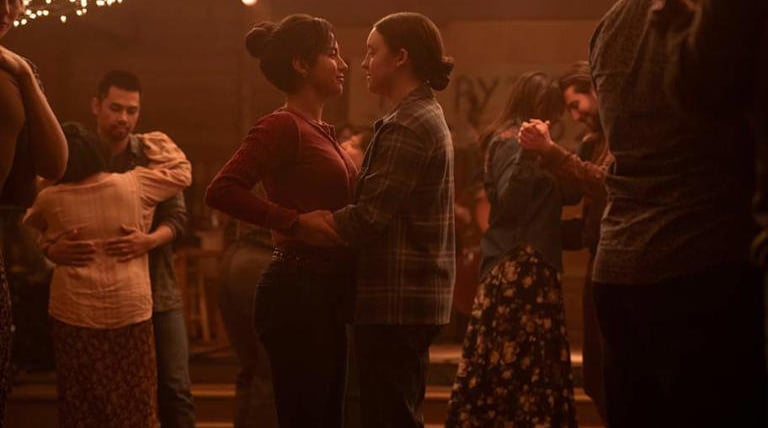

What we hope the next season brings
We want Abby’s perspective to expand the world building. We want to know how her life worked in the paramilitary firefly-adjacent group. We want to see more of the systemic attempts at understanding or containing the cordyceps. Is anyone doing real scientific work instead of just surviving? The game hinted at more complexity than we got in this season, and Abby’s POV feels like the right doorway to explore that.
We also hope Ellie continues to wrestle with what Joel’s choices mean for her. The therapist scenes feel like a template for what the show can do to unpack trauma with nuance. Ellie’s path is not set in stone. She might become vindictive, or she might find a way to integrate grief and love. The show thrives when it lets characters be morally complicated. We hope that continues.
Final thoughts on grief, agency, and representation
This season is about people trying to make meaning in a world that offers very little. People want a purpose. That is why revenge becomes a tempting, almost logical response to a catastrophic loss. Ellie needs meaning after Joel’s death. That is human. The show gives us these poor, complicated choices and refuses to judge them in simplistic ways. For queer viewers, Ellie and Dina’s story is a gift. It is messy, erotic in small imperfect ways, and ultimately tender.
We loved the detail of communal rituals for the dead, like Tommy preparing Joel’s body. That quiet moment of reverence is a human ritual stretching back millennia. It grounds the apocalypse in ceremony and helps remind us that even in a ruined world, people still make space for honoring the dead. Little details like that keep the story anchored in humanity.
How to keep this conversation kind
We are asking for one thing: if you comment, do it from curiosity, not entitlement. If you loved the season, celebrate it. If you hated aspects of it, be specific and generous in your critique. Remember the creators were deliberate in many of their choices, and the actors worked hard to translate a beloved game into television drama. If you have spoilers because you played the game, please do not post them in the thread if others asked not to know. Let us keep this space for thoughtful, spoiler-free takes.
Closing notes
Season two gave us messy grief, brutal human cruelty, tender queer love, and a cliffhanger that makes us desperate for what comes next. It is a weird mix of brutal horror and soft queer intimacy, and that is the tone we want more shows to attempt. The Last of Us continues to be courageous enough to make its characters morally complicated and to ask the audience to sit with discomfort.
Thanks for reading. If you enjoyed this written version of our episode, come hang out with us on our Discord and Patreon for full reaction videos, extended discussions, and ad free content. We will keep avoiding spoilers, but we will be loudly theorizing until the next season lands.
Until next time, hydrate for Lesbian Jesus, and gay it up all over the place!
